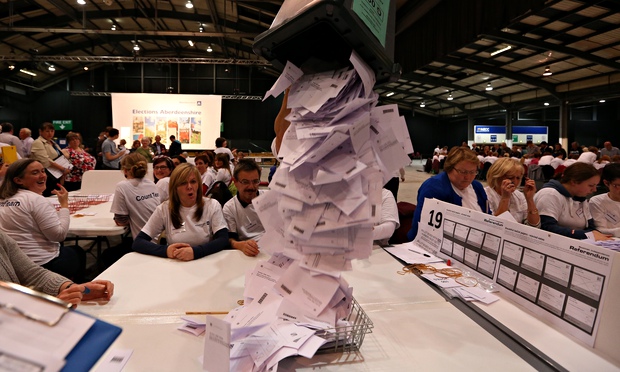Russian observers say referendum count took place in rooms that were too big and did not meet international standards

Ballot boxes are opened as counting begins in the Scottish referendum in Aberdeen. Photograph: Scott Heppell/AP
Luke Harding http://www.theguardian.com
Friday 19 September 2014 08.12 EDT
Russia has said the conduct of the Scottish referendum “did not meet international standards”, with its observers complaining the count took place in rooms that were too big and that the procedure was badly flawed.
In an apparent attempt to mirror persistent western criticism of Russia’s own elections, Igor Borisov – an accredited observer – said the poll failed to meet basic international norms.
Borisov and three other Russians arrived in Edinburgh on Wednesday evening, the state news agency Ria Novosti reported. The team from Moscow’s Public Institute of Suffrage watched voting take place in the Scottish capital and the surrounding area. It also met with Scottish politicians, voters and representatives from non-governmental organisations, Ria said.
Advertisement
Borisov said he was unimpressed by what he saw. He said the room where he watched the count on Thursday night was a cavernous “aircraft hangar” next to an airfield. It was difficult to see what was going on, he said, adding: “The hangar is approximately 100m by 300m. There are tables, with voting papers stacked upon them, but the observers are stuck around the perimeter. Even if you want to, it’s impossible to tell what’s happening. It’s also unclear where the boxes with ballot papers come from.”
Borisov said the US state department, the UK and other western countries loudly hectored the Kremlin about Russia’s supposed democratic deficiencies. But in this instance, he said, London and Edinburgh had not “fully met” the requirements of a proper referendum.
“Nobody was interested in who was bringing in the voting slips. There were no stamps or signatures as the bulletins were handed over,” he said.
Supporters of the Russian president, Vladimir Putin, had been fervently hoping for a yes vote. Some Russian nationalists had even fixed yes badges to their Twitter profiles, with one –Konstantin Rykov – adding a “Mc” to the front of his Cyrillic surname. (The badge and “Mc” had disappeared by Friday morning). The Kremlin apparently saw Scottish independence as a way of justifying its own hasty annexation of Crimea in March, following a “referendum” conducted in just three weeks and condemned by the west, as armed Russian forces and irregulars swarmed over the Crimean peninsula. Moscow also felt that a yes vote would weaken the UK and bring to power a post-independence Scottish government more amenable to Moscow’s wishes. Alex Salmond, Scotland’s first minister, expressed qualified admiration for President Putin in an interview with GQ in March.
The Kremlin propaganda channel RT, meanwhile, speculated that the result might have been rigged and expressed surprise at the “North Korean” levels of turnout.
Afshin Rattansi, the presenter of RT’s Going Underground show, said there were “international considerations”, such as the UK’s nuclear deterrent, which had affected the outcome. He said: “With the vote as close as this, with the mainstream media on one side, with a massive amount of people from Westminster running up to beg Scotland the other way, and certain recounts in certain bits of the poll, which way did the vote go, really?”
He added: “It is normally the sort of turnout you would expect in North Korea. Usually media here would go ‘we don’t believe it. How can it be nearly 90%?'”
On Friday the Donetsk People’s Republic – the Ukrainian rebel enclave – said that it, too, believed the Scottish referendum had been falsified. Miroslav Rudenko, a member of the republic’s self-declared supreme council, said he suspected the UK government was guilty of foul play. “I don’t rule out that the British authorities have falsified the results of this referendum. The difference between those who voted in favour of independence and against it is not so great,” he told the Russian news agency Interfax.
Rudenko said the west was guilty of “double-standards”. It had allowed a referendum in Scotland but refused one for Donestk and Luhansk, the rebel enclaves where separatists backed by Kremlin firepower are fighting Ukrainian troops.











Sign up on lukeunfiltered.com or to check out our store on thebestpoliticalshirts.com.